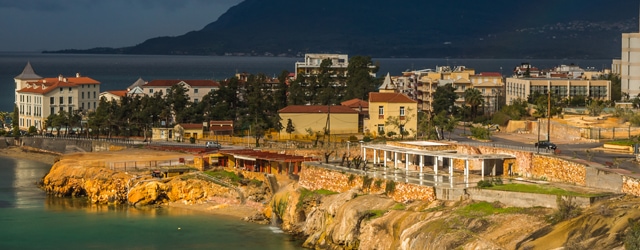The birthplace of democracy is striving to build a competitive economy while simultaneously handling a refugee crisis and paying its creditors.

When it comes to reviving the Greek economy, an obsession with paying down public debt may miss the mark, since the stock of debt only matters for cash flow implications. Greece does, however, need its debt maturities to be lengthened and interest rates locked in—short-term measures European finance ministers recently agreed to for 2017.
Reducing debt alleviates budget pressures, buying Greece some breathing room. The most important thing the government can do, says Costas Meghir, a professor of economics at Yale University, “is to the lay foundations for growth and make the economy competitive, with clear routes for businesses to work.”
Greece’s finances have stabilized in recent quarters. GDP, which had expanded in Q2, surprised on the upside, growing by 0.8 in Q3; the primary balance showed a €1.3 billion (US$ 1.4 billon) surplus, compared to last year’s €800 million deficit. “The average interest on Greek debt (4.2%) was smaller than in Italy (4.3%) and Portugal (4.9%), despite Greek debt having a longer average maturity and higher country risk,” says Dimitri Vayanos, professor of finance, London School of Economics and Political Science.
To bring finances under control, “every aspect of Greek life must be reformed,” insists Meghir. Anna Diamantopoulou, minister of Education from 2009-2012, introduced university competition and scientific councils, and abolished student participation in elections. Those laws have now been dismantled. “Greece used to have good—or at least respectable—universities,” Meghir laments.
CHALLENGES AND REFORMS
Vayonos describes global Greek rankings as “depressingly low” for some long-term growth determinants: In 2015, of 28 EU countries, the World Bank put Greece at 26th for ease of doing business and 27th for efficiency of courts. The latest Organization for Economic Co-operation and Development (OECD) stats put Greece 31st out of 34 countries for product market regulation. Although property values have fallen by at least 40% over the past five years, the government refuses to adjust taxes to the new values. Real estate remains a key savings vehicle for Greeks, as financial markets are immature and the stock market is thin. The weakened property market has depleted their savings, which feeds into less consumption. The implicit tax rate on labor, i.e., the difference between what a firm pays for a worker minus what the worker actually receives, is one of the highest in the OECD: 43.4% for a married household with two children in 2015, vs an OECD average of 26.9%. That suppresses consumption.
Lingering uncertainty about a Grexit, meanwhile, dampens investor enthusiasm. “Firms won’t invest in a country that might go through such a dramatic event,” Vayonos notes.
So how is Greece to grow? “Unfortunately, the Greek system subsidizes informality, creating incentives for low-quality and low-tech businesses,” says Meghir. Tourism, for example, a mainstay, is a precarious industry dependent on external factors.

Another obstacle is the sway of vested interests, like dairy farmers’ objections to reforms designed to lower milk prices by increasing cheap imports. “They met resistance from milk producers, with organized demonstrations,” explains Diego Iscaro, senior economist, IHS Global Insight. Iscaro advocates improved contract enforcement and a more efficient judiciary system. The OECD has proposed facilitating out-of-court settlements; perhaps commercial court fees might be paid electronically. Likewise, permitting firms and taxpayers to manage tax communications with authorities by internet would help reduce red tape.
Reforms could mitigate these daunting challenges: Corporate and labor taxes might be trimmed and consumption taxes imposed. Expenditures could be cut. “With political will, there should be ways to make spending cuts without a huge impact on public services,” according to Iscaro. For example, since the beginning of the crisis, the government has encouraged early retirement, hiking pension payouts. If some of these early retirees returned to employment, they might continue working while receiving some pension money.
Corruption is an issue too. Public officials hire political cronies with high salaries—in the chronically loss-making defense industry, for example—or dole out largess from the public purse. The Greek sugar industry received a €30 million subsidy in 2015 in the middle of a budget crisis. The government pays €100 million a month—0.7% of GDP—to rent office space, often three to four times above market price. “It’s partly because of bureaucracy and partly corruption, with rental properties owned by connected businesspeople,” says Vayanos.
Although politicians and patronage may rule in healthcare or the energy sector, the banking industry has developed more arm’s-length relationships to the government. Greek banks are trapped in a vicious cycle, victims of the country’s overall economic collapse (unlike banks in Spain, where the crisis originated in the banking sector). Economic recovery might allow nonperforming loans to decline, restoring a virtuous cycle. Currently, banks are loath to address the non-performing loans because doing so would lower their capital bases. “It’s difficult to fund a ‘bad bank’ without foreign direct investment,” Iscaro adds. “The Greek government can’t, and there’s insufficient political will from Europe.”
State ownership in the country’s four largest banks has actually fallen dramatically. In 2016, the state owned 11% of Alpha Bank, 2.4% of Eurobank, 40.4% of NBG and 26.4% of Piraeus. Before the last recapitalization, those respective stakes were 66.3%, 35.4%, 57.2% and 66.9%. Back in 2012, eurozone countries provided a €37 billion loan for Greek banks through the Hellenic Financial Stability Fund, controlled by the Ministry of Finance. In 2015, the Single Supervisory Mechanism took over, controlled by the European creditors, now charged with appointments of senior personnel. “It’s not ideal, but better than under the Greek government,” Vayanos comments.
For all its woes, Greece remains blessed with human capital, both at home and abroad, and reserves of goodwill around the world. The country has negotiating levers, too, like the refugees it is harboring. Mehgir is “proud” that they have been treated well without stoking populist anger.
That said, investors will not step in without a more viable plan for a productive economy.
GFmag.com Data Summary: Greece
|
Central Bank: Bank Of Greece | |||
|
International Reserves |
$6 billion | ||
|
Gross Domestic Product (GDP) |
$195.3 billion | ||
|
Real GDP Growth |
2013 -3.2% |
2014 0.7% |
2015 -0.2% |
|
GDP Per Capita—Current Prices |
$17,988.51 | ||
|
GDP—Composition By Sector* |
agriculture: 4% |
industry: 15.2% |
services: 80.8% |
|
Inflation |
2013 -0.9% |
2014 -1.4% |
2015 -1.1% |
|
Public Debt (general government |
2013 177.7%% |
2014 180.1% |
2015 180.1% |
|
Government Bond Ratings (foreign currency) |
Standard & Poor’s B- |
Moody’s Caa3 |
Moody’s Outlook STA |
|
FDI Inflows |
2013 $2.9 billion |
2014 $2.7 billion |
2015 $1.1 billlion |
* Estimates Source: GFMag.com Country Economic Reports



